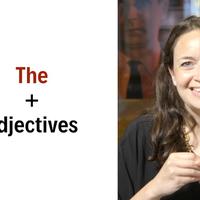The + adjectives - English In A Minute - YouTube
|||||Minute|
영어|형용사|||||
Die + Adjektive - Englisch in einer Minute - YouTube
The + adjectives - English In A Minute - YouTube
Los + adjetivos - English In A Minute - YouTube
Les + adjectifs - English In A Minute - YouTube
Gli aggettivi + - Inglese in un minuto - YouTube
形容詞 - English In A Minute - YouTube
형용사 + 형용사 - 1분 안에 끝내는 영어 - YouTube
Būdvardžiai + - Anglų kalba per minutę - YouTube
Przymiotniki + - Angielski w minutę - YouTube
Os + adjetivos - Inglês em um minuto - YouTube
The + прилагательные - English In A Minute - YouTube
The + adjectives - English In A Minute - YouTube
Прикметники The + - англійська за хвилину - YouTube
\+ 形容词 - 一分钟英语 - YouTube
+ 形容詞 - 一分鐘英語 - YouTube
Hi! I'm Sam from BBC Learning English.
||Sam||BBC|Learning|
Hi! Ich bin Sam von BBC Learning English.
Oi! Sou Sam, da BBC Learning English.
Привет! Я Сэм из BBC Learning English.
And today, let's look at how we can change
Und heute schauen wir uns an, wie wir uns ändern können
And today, let's look at how we can change
E hoje, vamos ver como podemos mudar
И сегодня давайте посмотрим, как мы можем изменить
adjectives into nouns
|in|Sure Please provide the adjectives you would like to use
|en|
Adjektive in Substantive
adjectives into nouns
adjetivos em substantivos
превращение прилагательных в существительные
when talking about groups of people in general.
wenn es um Personengruppen im Allgemeinen geht.
quando se fala de grupos de pessoas em geral.
когда речь идет о группах людей в целом.
I'm from England
Ich bin aus England
Я из Англии.
and I can talk about people from my country in
|||||||o meu||
und ich kann über Leute aus meinem Land sprechen
и я могу говорить о людях из моей страны в
two ways:
zwei Wege:
двумя способами:
'English people talk about the weather a lot,'
|||||tempo||
"Die Engländer reden viel über das Wetter"
'Os ingleses falam muito sobre o tempo'
Англичане часто говорят о погоде.
where I use the adjective 'English'
wobei ich das Adjektiv 'Englisch' verwende
onde eu uso o adjetivo 'inglês'
где я использую прилагательное "английский".
to describe the noun 'people'.
um das Substantiv „Menschen“ zu beschreiben.
를 사용하여 '사람'이라는 명사를 설명할 수 있습니다.
opisać rzeczownik „ludzie”.
Or I can take the adjective 'English'
Oder ich kann das Adjektiv 'Englisch' nehmen
Или я могу взять прилагательное "английский".
and turn it into a noun with 'the':
|명사로 'the'를 붙여서 바꿔||||||
|e trasformalo||||||
und verwandle es in ein Substantiv mit 'the':
e transformá-lo em um substantivo com 'the':
и превратить его в существительное с помощью 'the':
'The English talk about the weather a lot.'
„Die Engländer reden viel über das Wetter.“
'영국인들은 날씨에 대해 많이 이야기합니다.'
„Anglicy dużo mówią o pogodzie”.
"Англичане много говорят о погоде".
You can use this rule to talk about
Sie können diese Regel verwenden, um darüber zu sprechen
Você pode usar esta regra para falar sobre
Вы можете использовать это правило, чтобы рассказать о
other groups of people as well. For example:
auch andere Personengruppen. Zum Beispiel:
outros grupos de pessoas também. Por exemplo:
и другие группы людей. Например:
The rich have more than the poor.
Die Reichen haben mehr als die Armen.
부자는 가난한 사람보다 더 많은 것을 가지고 있습니다.
Bogaci mają więcej niż biedni.
Богатые имеют больше, чем бедные.
But be careful!
Aber sei vorsichtig!
Но будьте осторожны!
Yes, the groups of people are plural,
Ja, die Personengruppen sind Plural,
예, 사람 그룹은 복수로 구성됩니다,
Да, группы людей множественны,
and yes the verb is plural,
und ja das verb ist plural,
i tak, czasownik jest w liczbie mnogiej,
и да, глагол во множественном числе,
but we don't add 's' to the end of these words.
aber wir fügen am Ende dieser Wörter kein 's' hinzu.
하지만 이 단어의 끝에는 's'를 추가하지 않습니다.
но мы не добавляем "s" в конце этих слов.

